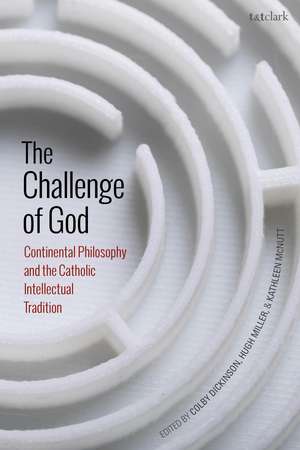The Challenge of God: Continental Philosophy and the Catholic Intellectual Tradition
Editat de Colby Dickinson, Professor Hugh Miller, Kathleen McNutten Limba Engleză Hardback – 22 ian 2020
| Toate formatele și edițiile | Preț | Express |
|---|---|---|
| Paperback (1) | 216.08 lei 43-57 zile | +68.29 lei 5-11 zile |
| Bloomsbury Publishing – 28 iul 2021 | 216.08 lei 43-57 zile | +68.29 lei 5-11 zile |
| Hardback (1) | 596.81 lei 43-57 zile | |
| Bloomsbury Publishing – 22 ian 2020 | 596.81 lei 43-57 zile |
Preț: 596.81 lei
Preț vechi: 763.42 lei
-22% Nou
Puncte Express: 895
Preț estimativ în valută:
114.24€ • 124.13$ • 96.02£
114.24€ • 124.13$ • 96.02£
Carte tipărită la comandă
Livrare economică 21 aprilie-05 mai
Preluare comenzi: 021 569.72.76
Specificații
ISBN-13: 9780567689900
ISBN-10: 0567689905
Pagini: 184
Ilustrații: 1 bw illus
Dimensiuni: 156 x 234 x 19 mm
Greutate: 0.43 kg
Editura: Bloomsbury Publishing
Colecția T&T Clark
Locul publicării:London, United Kingdom
ISBN-10: 0567689905
Pagini: 184
Ilustrații: 1 bw illus
Dimensiuni: 156 x 234 x 19 mm
Greutate: 0.43 kg
Editura: Bloomsbury Publishing
Colecția T&T Clark
Locul publicării:London, United Kingdom
Caracteristici
Showcases the leading figures in continental philosophy of religion rethinking their scholarly projects in engagement with the Catholic intellectual tradition
Notă biografică
Colby Dickinson is Associate Professor of Theology at Loyola University Chicago, USA.Hugh Miller is Assistant Professor of Philosophy at Loyola University Chicago, USA. Kathleen McNutt is a PhD candidate at Loyola University Chicago, USA
Cuprins
Notes on ContributorsPreface - Colby Dickinson, Hugh Miller and Kathleen McNutt, Loyola University Chicago, USAIntroduction: God as Challenge: The Past and Future of Continental Philosophy of Religion - Bruce Ellis Benson, University of St. Andrews, UKChapter 1: Is God a Challenge for Philosophy? - Adriaan T. Peperzak, Loyola University Chicago, USAChapter 2: On the Infinite: A Response to Adriaan Peperzak - David Tracy, University of Chicago, USAChapter 3: God and the Ambivalence of Being - Jean-Luc Marion, University of Chicago, USA Chapter 4: Being, God, Nihilism, Love: On Marion's 'Ambiguity of Being' - Hugh Miller, Loyola University Chicago, USAChapter 5: A Phenomenology of Revelation: Contemporary Encounters with Saint Ignatius Loyola - Robyn Horner, Australian Catholic University, AustraliaChapter 6: 'Consolation Without Previous Cause'? Consolation, Controversy, and Devotional Agency - J. Michelle Molina, Northwestern University, USAChapter 7: Tradition and Event: Radicalizing the Catholic Principle - John D. Caputo, Syracuse University and Villanova University, USAChapter 8: Theological Thinking and John Caputo's 'Tradition and Event: Radicalizing the Catholic Principle' - John McCarthy, Loyola University Chicago, USAChapter 9: Epic and the Crucified God - Thomas J. J. Altizer, SUNY Stony Brook, USAChapter 10: From Scripture, Epic, and Radical Catholicism: A Response to Thomas J.J. Altizer - Adam Kotsko, Shimer College, USAChapter 11: Anatheism: A Theopoetic Challenge - Richard Kearney, Boston College, USAChapter 12: The God Machine: Techno-Theology and Theo-Poetics - John Panteleimon Manoussakis, College of the Holy Cross, USABibliographyIndex
Recenzii
Well conceived and well executed, this volume will be required reading for anyone concerned about the history of CPR or invested in contributing to its future. Summing Up: Highly recommended. Upper-division undergraduates through faculty.
Continental Philosophy has led thinkers within the Catholic intellectual tradition to move beyond the confines of ontotheological thinking. Like a child, servant, slave, or someone who hears, being called by the Spirit, it has been engaged in enlarging its own horizons. Bearing witness to God from otherness and difference, and starting off from decentred, relational anthropologies, these endeavours have prompted inspiring dialogues for both philosophers and theologians alike!
Well organized ... interesting collection.
Continental Philosophy has led thinkers within the Catholic intellectual tradition to move beyond the confines of ontotheological thinking. Like a child, servant, slave, or someone who hears, being called by the Spirit, it has been engaged in enlarging its own horizons. Bearing witness to God from otherness and difference, and starting off from decentred, relational anthropologies, these endeavours have prompted inspiring dialogues for both philosophers and theologians alike!
Well organized ... interesting collection.
